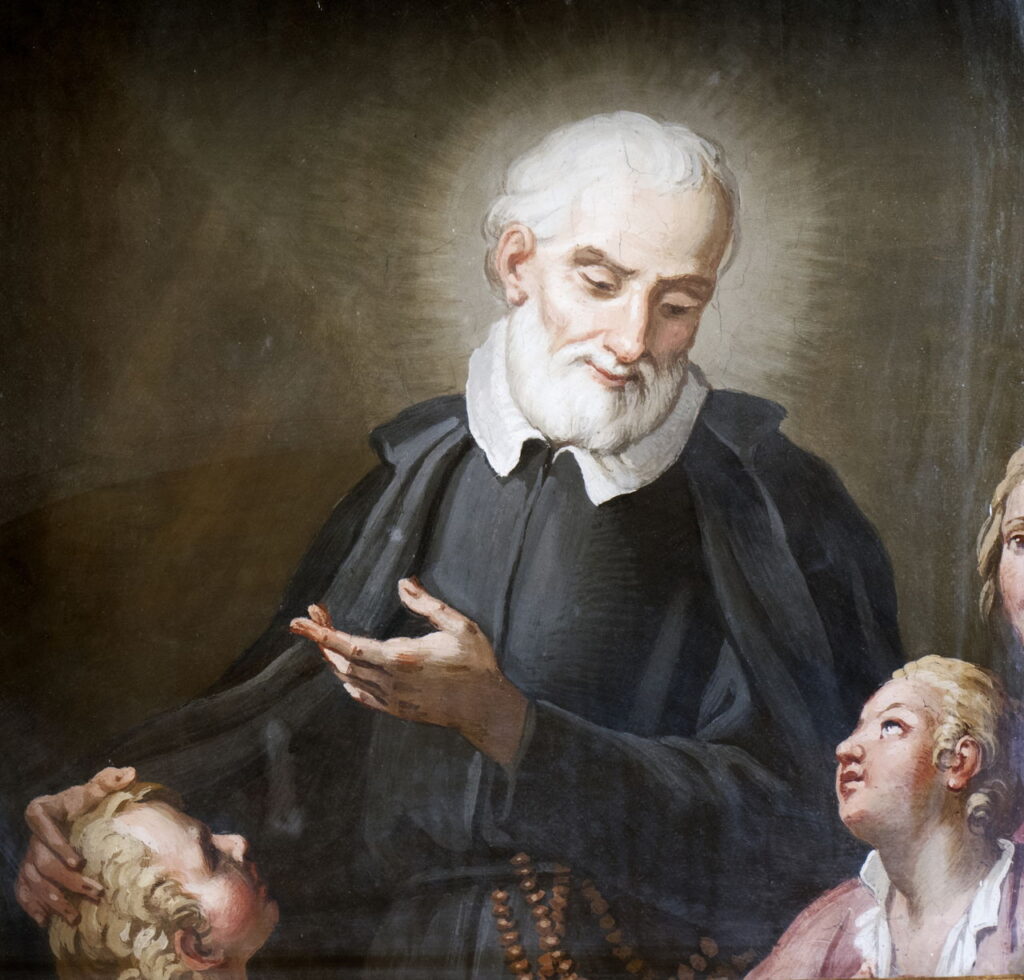
MAY 26 is the feast day of ST. PHILIP NERI (+1595), the “Second Apostle of Rome.”
Filippo Neri was born July 21, 1515 in Florence, one of four children. His father was Francesco Neri, an aristocrat in service of the government. The family were relatively religious, not necessarily pious. Filippo was known, as a child, for being cheerful and obedient. His schooling took place with the Dominican friars from the monastery at San Marco, Florence.
At 18, the young man was sent off to live with a wealthy uncle in San Germano. The possibility was that he would learn the business and possibly inherit it down the road. Not very long after his arrival, he experienced a mystical vision, which he considered his Christian conversion. Philip lost interest in business and owning property. He felt a call from the Holy Spirit to serve Jesus and the Church.
So, he went to Rome. Most likely with the aide of his father, Philip obtained the position of tutor for the sons of a businessman from Florence. Both boys improved in all aspects of life and faith, due in large part to the efforts of Philip. On the young man’s side, he began to develop an ascetic life.
After two years, Philip moved on and began studying philosophy and theology at Sapienza and at St. Augustine monastery. He was observed to be a “promising student”. But, after three years, he gave up on the idea of ordination. He decided to help the poor and re-evangelize a poorly churched Rome.
For seventeen years, Philip walked the streets and public squares talking to people. He would say to those interested, “Well, brothers, when shall we begin to do good?” Then he would take them to hospitals and other places of need and have them work. He was able to do this with a sense of gentleness and friendship, not harshness and criticism.
Eventually, he returned to the idea of becoming an ordained priest, since he had, by then, taken all the minor orders. Within three years, he was ordained and started the Confraternity of the Holy Trinity, an organization of mostly laymen. They met at a certain church and introduced the concept of 40 Hours Devotion to the Holy Eucharist to Rome. Fr. Philip saw the need for a reform of the Catholic Church, not only for updating some aspects, but also for increasing use of the confessional.
Within a few years of his ordination, Fr. Philip started an Oratory at the Hospital of San Girolamo della Carita. What he did was begin talks on scripture, saints, morals, or other uplifting subjects in the hall, or oratory, to which men could come. This developed into one-day pilgrimages to seven churches in Rome.
Being in Rome brought him into close association with the popes and many cardinals, some of whom joined his Oratory. He then became a trusted advisor to popes, kings, cardinals, and, also, the poor.
Fr. Philip’s greatest merit was the understanding that the ascetic life and system of monasticism would not attract many in the secular life. He offered himself as a sample of a homey, simple life style which could relate to the new times. His rooms were pleasant with decent furniture, his clothes were clean and pressed, his attitude was one of an open, caring soul and his prayer life was intense, yet able to attract the simple. He lived as others were capable of living.
On the Feast of Corpus Christi, 1595, Fr. Philip’s physician told him he was not well. He had not been well for years. The good priest realized that his life was coming to an end. So, he listened to confessions all day and spoke with several visitors, continuing his life’s work. On going to bed, he commented “Last of all, we must die.” At midnight, he had a hemorrhage and died. The simple end to a simple man.
We will never be able to count the number of souls he converted. But there were thousands. His rule of thumb for conversions was: “A joyful heart is more easily made perfect than a downcast one.” How is your heart? Is it ready for conversion?

Recent Comments